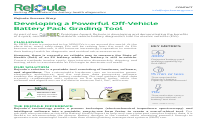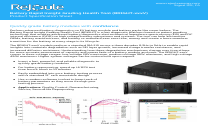
ReJoule
Founded Year
2017Stage
Angel | AliveTotal Raised
$4.92MLast Raised
$100K | 3 yrs agoMosaic Score The Mosaic Score is an algorithm that measures the overall financial health and market potential of private companies.
+31 points in the past 30 days
About ReJoule
ReJoule focuses on battery diagnostics technology relevant to the clean energy and automotive sectors. The company provides tools for evaluating the health and safety of electric vehicle batteries and measuring the state of health of repurposed batteries. ReJoule serves the automotive industry and battery repurposers. It was founded in 2017 and is based in Long Beach, California.
Loading...
ReJoule's Product Videos


ReJoule's Products & Differentiators
Pack Grading Tool (PGT)
Using an EV’s charge port, ReJoule’s PGT is a portable device that can measure a battery pack’s State of Health while the battery is still in-vehicle.
Loading...
Expert Collections containing ReJoule
Expert Collections are analyst-curated lists that highlight the companies you need to know in the most important technology spaces.
ReJoule is included in 3 Expert Collections, including Auto Tech.
Auto Tech
3,978 items
Companies working on automotive technology, which includes vehicle connectivity, autonomous driving technology, and electric vehicle technology. This includes EV manufacturers, autonomous driving developers, and companies supporting the rise of the software-defined vehicles.
Energy Storage
5,350 items
Companies in the Energy Storage space, including those developing and manufacturing energy storage solutions such as lithium-ion batteries, solid-state batteries, and related software for battery management.
Energy Management Software
677 items
Companies creating software to help manage, optimize, and automate energy management and optimization.
ReJoule Patents
ReJoule has filed 3 patents.
The 3 most popular patent topics include:
- energy storage
- electrical engineering
- electrical test equipment

Application Date | Grant Date | Title | Related Topics | Status |
|---|---|---|---|---|
5/6/2021 | 10/31/2023 | Electronic test equipment, Electric power conversion, Electrical engineering, Energy storage, Electrical test equipment | Grant |
Application Date | 5/6/2021 |
|---|---|
Grant Date | 10/31/2023 |
Title | |
Related Topics | Electronic test equipment, Electric power conversion, Electrical engineering, Energy storage, Electrical test equipment |
Status | Grant |
Latest ReJoule News
Aug 8, 2025
at a CAGR of ~65% during the forecast period, according to a new report by MarketsandMarkets. The growing adoption of electric vehicles (EVs) is expected to fuel a multibillion-dollar market for second-life batteries by 2030, particularly those based on lithium iron phosphate (LFP) chemistry. LFP batteries are ideal for stationary applications like grid energy storage, residential systems, EV charging stations, and data centers due to their inherent safety, long cycle life, and favorable cost-effectiveness. The declining cost of second-life batteries enhances economic viability, especially as new battery prices fall. At the same time, their reuse supports a circular economy by reducing the CO2 emissions by several tonnes annually and mitigating raw material scarcity. However, several critical challenges could hinder the recovery and repurposing process, including the absence of standardized protocols for accurately assessing battery health, the complexities of integrating these batteries into diverse applications, existing regulatory ambiguities, fragmented supply chains, and inadequate reverse logistics infrastructure. Download an Illustrative overview: https://www.marketsandmarkets.com/pdfdownloadNew.asp?id=40890194 Browse in-depth TOC on " Second Life EV Battery Market 75 - Tables 19 - Figures 104 - Pages Utility-scale grid services hold the largest share of the second-life EV battery market. Utility-scale grid applications dominate the actual usage of the second-life EV battery market. These repurposed batteries are attractive for grid applications due to their cost advantage (up to 70% cheaper than new batteries in 2025) and their suitability for less-demanding, lower-cycle stationary uses, such as grid balancing, renewable energy integration, and backup power. Further, these batteries also excel in frequency regulation, peak shaving, and power arbitrage by leveraging their residual capacity for 100-300 cycles annually. Most global players utilize these batteries for energy storage, leveraging renewable energy sources like solar and wind power. Major OEMs such as Volvo, BMW, Nissan (in collaboration with Sumitomo), and Volkswagen are partnering with energy providers and startups to repurpose retired EV batteries for stationary storage projects. For example, Volkswagen Group's partnership with Audi and the energy company, E.ON, has initiated projects using used EV batteries to stabilize grid loads and manage peak demand. With the strategic shift away from coal-powered electricity, microgrids supported by solar and wind farms are expected to experience significantly higher demand for second-life EV batteries across Europe , the US, China , and other Asian countries for grid-scale energy storage. In addition, advancements in battery management, modular system design, growing policy momentum for the circular economy, and energy security would prompt the demand for second-life EV batteries for this application. Although the environmental advantages are significant, the dependence on subsidies (like EU & US DOT grants) and volatile electricity prices may limit profitability, leading to growth that is mainly concentrated in specific regions. In case costs decrease further or supportive policies are constantly updated, the demand for second life EV batteries is likely to expand in commercial & residential storage as well. Lithium-ion batteries exhibit the maximum demand in the second-life EV battery market. Lithium-ion battery technology dominates the market, as more than 95% of electric vehicles, including passenger and commercial vehicles, are installed with this battery technology. Decades of advancements have led to their high energy density, long lifespans, and quick charging & decreasing cost is also expected to make it more affordable and accessible to consumers. Lithium-ion batteries are advantageous for second-life applications due to their predictable state of health (SoH) retention and established performance benchmarks. Repurposers plan their testing and sorting strategies based on dominant chemistries (LFP and NMC) using tailored diagnostics that assess capacity, internal resistance, cycle count, and safety parameters aligned with each chemistry's characteristics. LFP batteries often require less intensive safety testing, while NMC batteries demand more rigorous monitoring due to their higher energy density and sensitivity to degradation. These focused testing protocols help maximize utilization, reliability, and safety in various second-life applications such as grid storage and commercial energy solutions. The continued predominance of lithium-ion technology is expected to remain strong, with second-life battery applications playing a vital role in advancing the global energy transition. Advancements in battery management systems, advanced diagnostic tools, and digital tracking solutions will further enhance the effectiveness and profitability of battery repurposing companies focused on this battery technology. However, there are certain challenges with this battery chemistry. For instance, if some supply-related drift (like 20% price hikes in 2024) and safety-related concern persists, the traction may shift to other alternatives like nickel-zinc or flow batteries. Also, it provides high energy density, but exhibits annual capacity loss of around 2-3% under typical usage, and inconsistent performance among batches, facing consistency and reliability issues, and challenges to reach ~250 GWH demand estimates by 2030. Though it carries significant cost benefits, their long-term viability depends heavily on the scalability of recycling processes, and government programs might impact unregulated markets. North America is expected to be the leading market in terms of the installed capacity of second life EV batteries. North America leads in installations due to its advanced grid infrastructure and strong policy incentives. These second-life EV batteries are likely to be used at data center stationary energy storage, microgrids for telecommunications and commercial backup, EV charging buffer systems, and domestic solar and grid-support systems. The US is the leading market in the region, with one of the most extensive retired battery stocks in the coming years that can be repurposed for various applications. Projects are consistently scaling, with single sites exceeding 50–60 MWh, and pipelines of new installations in development. Redwood Materials (US) operates the largest microgrid using second-life EV batteries with 63 MWH capacity in Nevada , powering a data center. It also has a pipeline of>1 GWh for various stationary applications. Other regional companies like Moment Energy, B2U Storage Solutions, and Smartville are scaling up production and deploying second-life EV battery systems for energy storage. Additionally, the region is poised to experience an emergence in the second life EV battery storage investments, propelled by ambitious government programs and large-scale industry initiatives. All these factors would lead North America to redirect hundreds of GWh per year of spent EV batteries into second life storage assets, gaining substantial environmental and economic gains by the decade's end. Key Market Second Life EV Battery Industry Prominent players in the Second Life EV Battery Companies include Tesla, Volvo, Toyota Motor Corporation, BMW Group, Nissan Motor Corporation, Connected Energy, B2U Storage Solutions, and Rejoule. Get 10% Free Customization on this Report: https://www.marketsandmarkets.com/requestCustomizationNew.asp?id=40890194 This report provides insights on: Analysis of critical technology roadmap parameters such as battery assessment & testing approaches, cell-level & algorithm-based battery management system, various system integration techniques, and software platform strategies Market Development: Comprehensive market information (the report analyzes & recommends the most dominant application demand across the considered regions under the scope) Market Diversification: Exhaustive information about strategic collaborations, potential geography expansion, recent projections & their capacity, and investments in the second-life EV battery industry Competitive Assessment: In-depth assessment of market shares, growth strategies, and product/technology offerings of leading OEMs & battery storage specialists such as Tesla, Volvo, Toyota Motor Corporation, BMW Group, Nissan Motor Corporation, Connected Energy, B2U Storage solutions, and Rejoule. Related Reports: EV Battery Recycling Market EV Battery Market EV Battery Testing Market Get access to the latest updates on Second Life EV Battery Companies and Second Life EV Battery Industry Growth About MarketsandMarkets™: MarketsandMarkets™ has been recognized as one of America's Best Management Consulting Firms by Forbes, as per their recent report. MarketsandMarkets™ is a blue ocean alternative in growth consulting and program management, leveraging a man-machine offering to drive supernormal growth for progressive organizations in the B2B space. With the widest lens on emerging technologies, we are proficient in co-creating supernormal growth for clients across the globe. Today, 80% of Fortune 2000 companies rely on MarketsandMarkets , and 90 of the top 100 companies in each sector trust us to accelerate their revenue growth . With a global clientele of over 13,000 organizations , we help businesses thrive in a disruptive ecosystem. The B2B economy is witnessing the emergence of $25 trillion in new revenue streams that are replacing existing ones within this decade. We work with clients on growth programs, helping them monetize this $25 trillion opportunity through our service lines – TAM Expansion, Go-to-Market (GTM) Strategy to Execution, Market Share Gain, Account Enablement, and Thought Leadership Marketing. Built on the 'GIVE Growth' principle, we collaborate with several Forbes Global 2000 B2B companies to keep them future-ready. Our insights and strategies are powered by industry experts, cutting-edge AI, and our Market Intelligence Cloud, KnowledgeStore™ , which integrates research and provides ecosystem-wide visibility into revenue shifts. To find out more, visit www.MarketsandMarkets™.com or follow us on Twitter LinkedIn and Facebook This News is brought to you by Qube Mark , your trusted source for the latest updates and insights in marketing technology. Stay tuned for more groundbreaking innovations in the world of technology. PR Newswire PR Newswire empowers communicators to identify and engage with key influencers, craft and distribute meaningful stories, and measure the financial impact of their efforts. Cision is a leading global provider of earned media software and services to public relations and marketing communications professionals. Your experience on this site will be improved by allowing cookies Cookie Policy
ReJoule Frequently Asked Questions (FAQ)
When was ReJoule founded?
ReJoule was founded in 2017.
Where is ReJoule's headquarters?
ReJoule's headquarters is located at 2888 Gundry Avenue, Long Beach.
What is ReJoule's latest funding round?
ReJoule's latest funding round is Angel.
How much did ReJoule raise?
ReJoule raised a total of $4.92M.
Who are the investors of ReJoule?
Investors of ReJoule include San Diego Angel Conference, IgniteX Accelerator, Southern California Energy Innovation Network, National Science Foundation, The California Energy Commission and 6 more.
Who are ReJoule's competitors?
Competitors of ReJoule include TWAICE and 2 more.
What products does ReJoule offer?
ReJoule's products include Pack Grading Tool (PGT) and 1 more.
Loading...
Compare ReJoule to Competitors

Ambri specializes in long duration energy storage solutions within the renewable energy sector. The company offers liquid metal battery technology for the integration of renewable energy sources into power grids. Ambri's products are aimed at renewable energy penetration and grid-scale energy management. It was founded in 2010 and is based in Marlborough, Massachusetts.

Amionx focuses on safety aspects of lithium-ion batteries in the energy storage sector. The company's technology, SafeCore, is designed to prevent thermal runaway in batteries, which can lead to fire or explosion. This technology is applicable for electric vehicles and military uses, where battery safety is a critical concern. It was founded in 2016 and is based in Carlsbad, California.

AVILOO focuses on the development of independent testing systems for the automotive industry. The company's main service is providing a diagnostic tool for the batteries of electric and plug-in hybrid vehicles, which helps users understand the current status of the battery and make informed purchasing decisions. It was founded in 2017 and is based in Wiener Neudorf, Austria.

Eatron Technologies develops software solutions for battery management systems within the automotive and mobility sectors. The company provides software that offers estimations of battery states and enables predictive diagnostics. Eatron's products are designed for integration with existing battery management systems, including State of Charge and State of Health monitoring, Remaining Useful Life predictions, and preventive diagnostics. It was founded in 2018 and is based in Warwick, United Kingdom.

Circunomics involves battery lifecycle management within the energy sector, focusing on the battery economy. The company provides analytics and a B2B marketplace for battery trade. Circunomics serves the mobility sector by offering second-life applications for lithium-ion batteries. It was founded in 2019 and is based in Mainz, Germany.

Peaxy specializes in predictive analytics and lifecycle management for batteries within the energy storage and electrification sectors. The company offers a cloud-based platform that utilizes machine learning to manage and optimize the entire battery lifecycle, from research and development to manufacturing and operation. Peaxy's solutions also extend to defense readiness and industrial equipment, providing maintenance recommendations and lifetime value optimization. It was founded in 2012 and is based in San Jose, California.
Loading...
